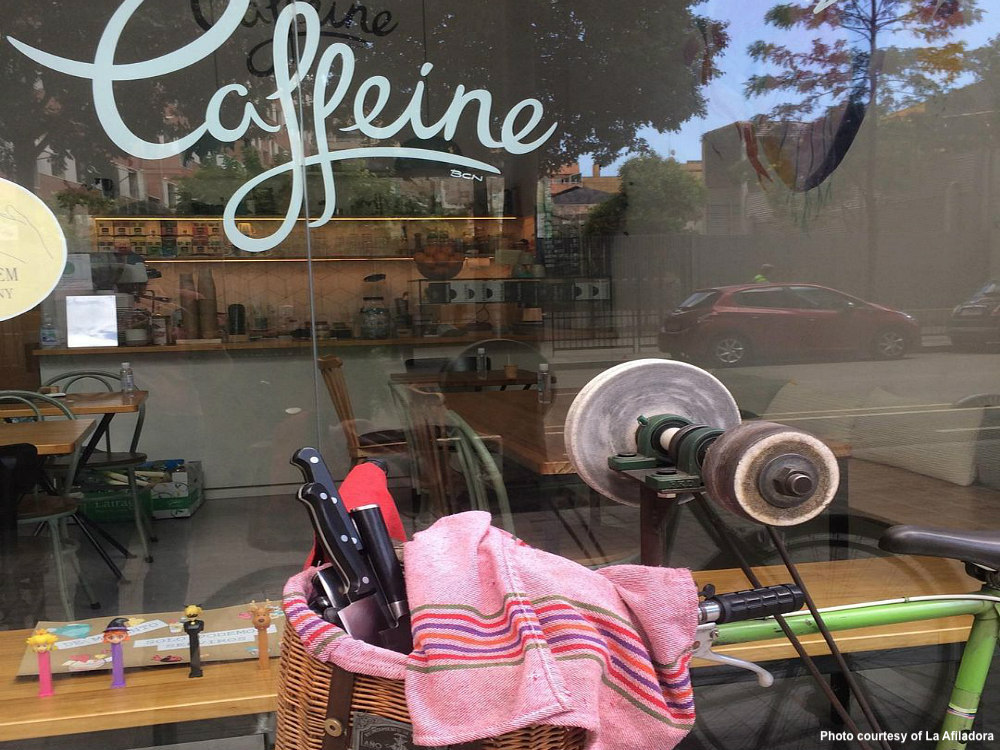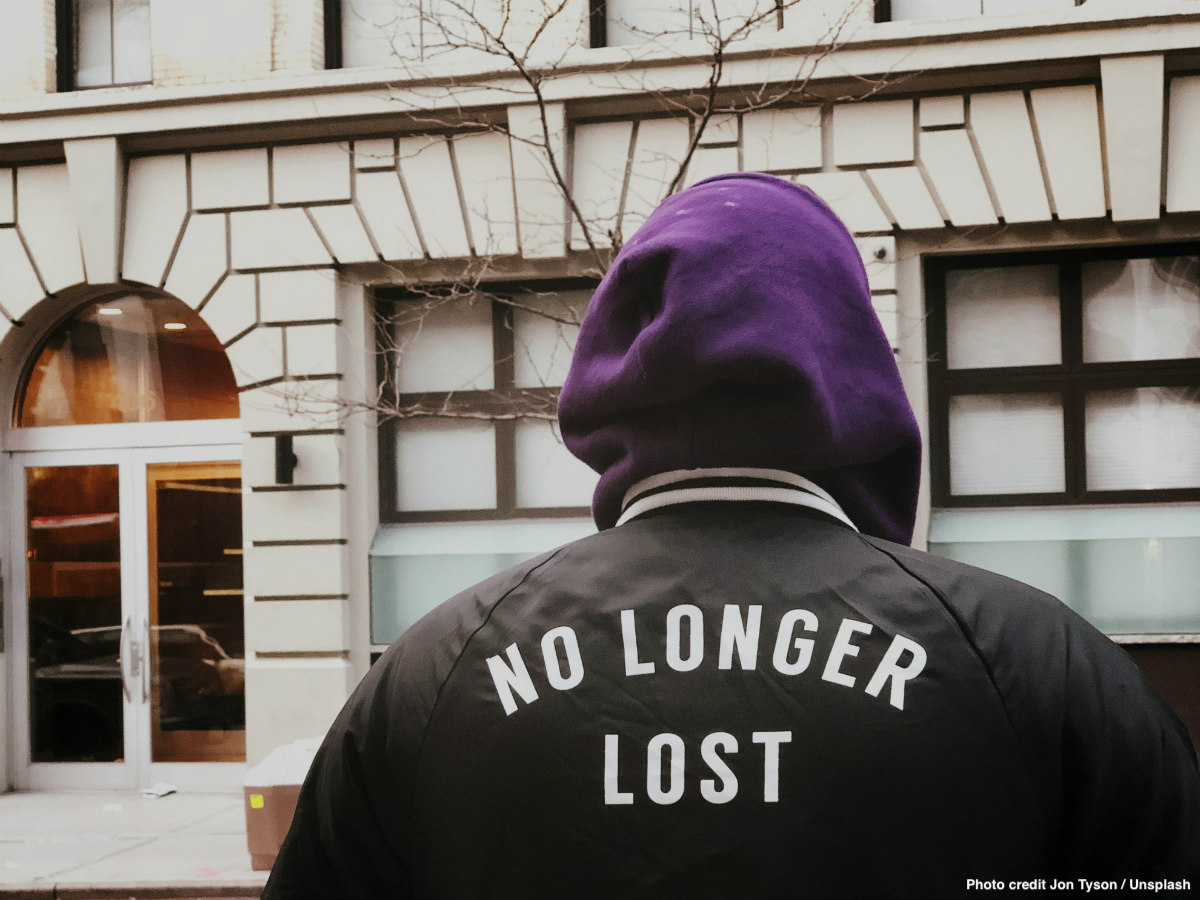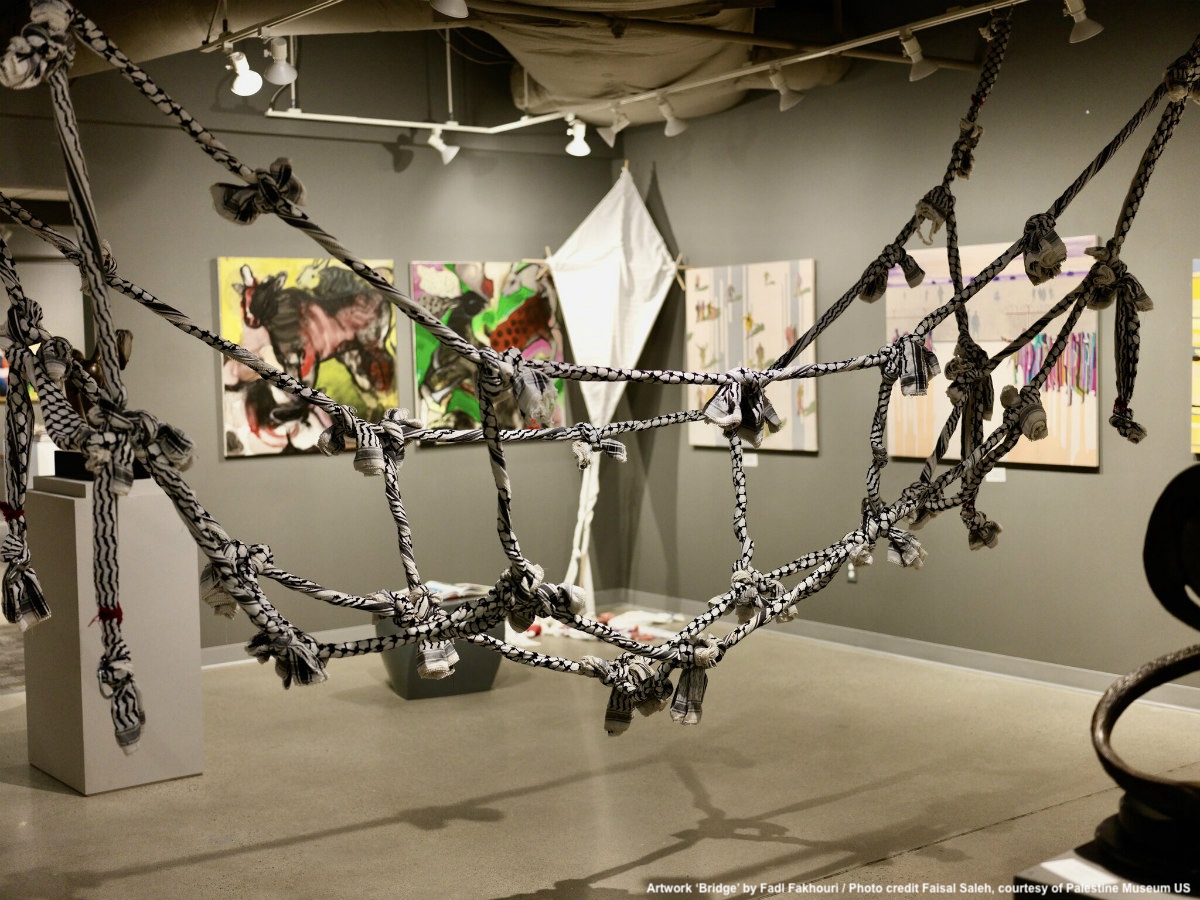There’s no shortage of excellent ibérico ham in Madrid or Barcelona, but thin, flexible, foot-long, razor-sharp cuchillo jamonero allows some professional carvers to enhance the taste with salty, gamey slices depending on the cut. Behind great food, there is an army of formidable knives wielded by experts – Japanese chefs even use different knives for different kinds of fish – and ideally sharpened by professional knife grinders. The latter is a century-old craftsmanship which is being reinvented at urban centres in Madrid and Barcelona, thereby resisting its disappearance from cities.
Until the 80s and early 90s the sound of the armonica of the knife grinder used to bring the attention of residents about his presence in the neighbourhoods of Spanish cities. Traditionally, he’d stand on the street sharpening knives on a pedal-operated grinding wheel mounted on a motorbike. Residents, cooks, craftsmen would rush to the streets with their knives-out for a service that nowadays rarely can be seen in hectic urban life. A wide array of ancient trades that are still being practised today, such as tapestry repairers, silversmiths have by now also moved away from urban centres.
I follow the steps of La Afiladora, one of the remaining true knife grinders on the streets of Barcelona, proving that one can be indignant and constructive at the same time. A profession rarely practised by a woman, she has made it fit in the city of the twenty-first century. La Afiladora, who prefers to remain anonymous and be known by her Instagram account name, came to the profession during the pandemic and saw the opportunity to eulogise a city long gone. She revived the importance of craftsmanship and the role of the knife grinder to maintain cutting tools used in endless kitchens, hairdressers, fishmongers, butchers, you name it, in our cities. She invested time to learn the skills of the grinder and began specialising in knives for chefs at kitchens. La Afiladora earned their trust to the point that if a chef moves to another restaurant, she keeps working with that chef in another location.
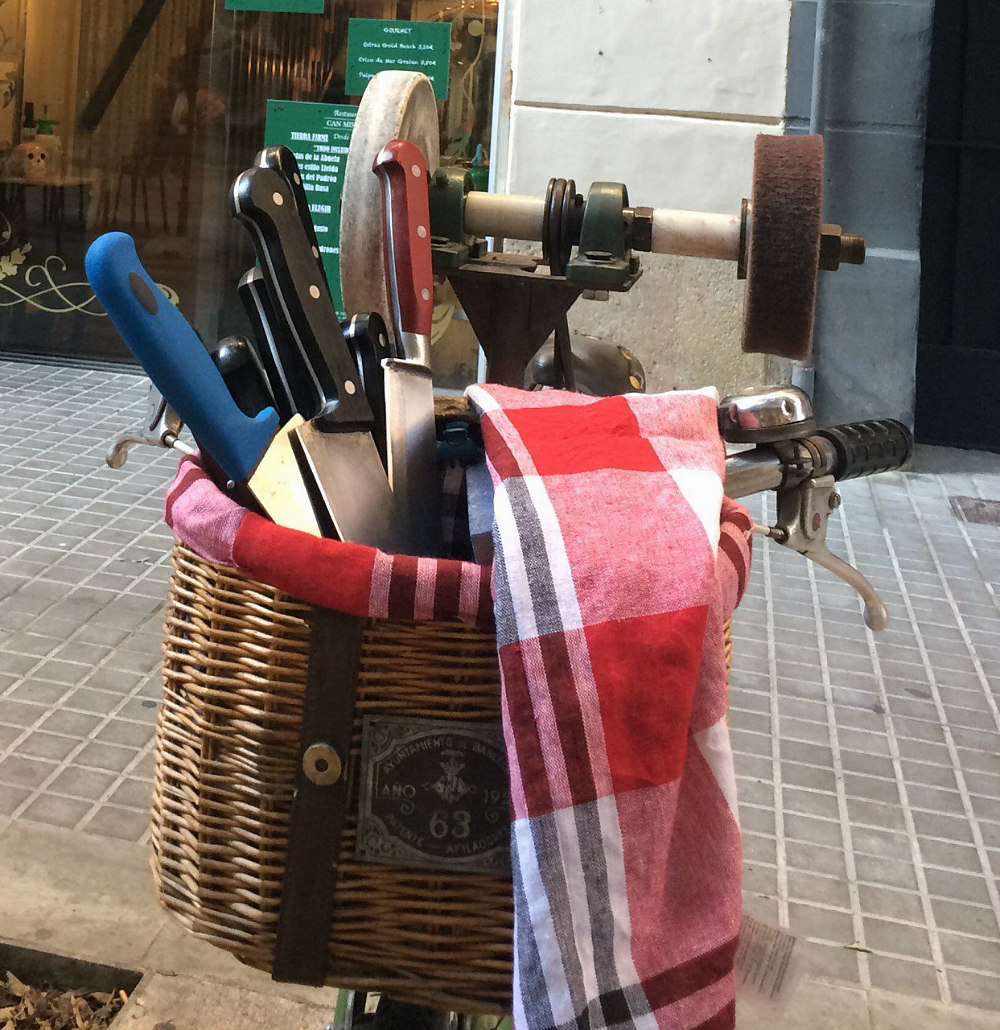
She doesn’t use a motorcycle, instead she prefers to ride her beautiful bike, using the pedals to operate the grinding wheel. Her daily routine also includes the interaction with neighbours and pop-and-mom shops in Barcelona. Yet this image more of a social entrepreneur rather than the traditional knife grinder is a motive of concern for her in how this hard-working profession is projected to the outside world. The long history of secrecy around it and its nostalgia for how life used to be on the streets of our cities tend to romanticise this profession that has suffered the marginalisation of traditional craftsmanship for so many years.
Markets in cities are disappearing and with it the traditional knife grinder.
The craft of the knife grinder is certainly very old. But according to research, the truly revolutionary invention was the introduction of an axis finished in a “stork” which, due to its eccentricity, transmits a rotary movement to an abrasive wheel through rhythmic pressure on a pedal, leaving the hands free to sharpen the object more sharply, fast and accurate. This motor system has been the one used throughout the centuries until the incorporation of the bicycle, the motorcycle or the electric motor by drivers of the grinding wheel rotation in the second half of the 20th century.
Obviously, knife grinders were something universal in Europe but what made it special in Spain is that this old technique appeared in a small region in the North West, called nowadays ‘A terra da chispa’ (translated ‘Land of the spark’). This name makes reference to the sparks flying from a knife grinder’s wheel when the metal of the knife comes in contact with it. But in a world in which communications at that time were difficult, different questions are asked. How did this profession reach this corner of Europe? and How did it spread to other cities?
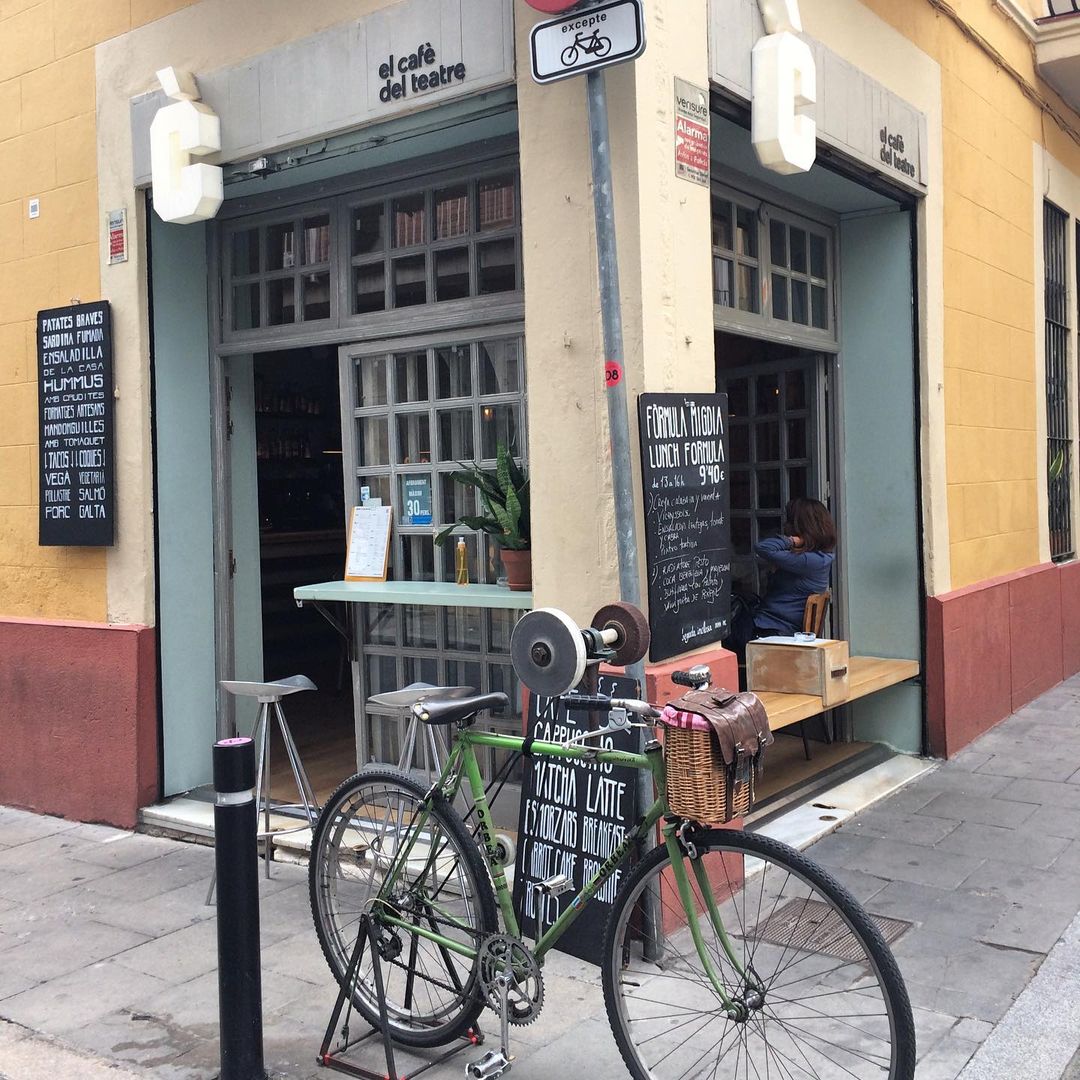
“The Camino de Santiago was the internet of that time and facilitated the equivalent to today’s industrial espionage,” jokes Lois Raposo, another knife grinder resisting in Madrid. It seems that a French knife grinder in the nineteenth century was heading to Santiago, and on his way asked a Galician carpenter to fix the grinder-wheel. The carpenter, fascinated by this technology, secretly took measures to reproduce the machine. From there a small industry of knife grinders and artisans was created in a region of migrants, who eventually took their profession to urban centres in Spain.
On October 3rd, 1991 an article from Los Angeles Times reported on the history of knife grinders in the city, whose forefathers came from a single valley in Italy in the nineteenth century, “traditionally wearing a battered, floppy-brimmed hat,” and standing on a downtown street corner. “At the turn of the century, you could have found at least one moleta [knife grinder] plying his trade in any big American city.” Interestingly, while in Spain knife grinders from the same region spread around cities in the country keeping the skills in good secrecy as a way of subsistence through family generations, knife grinders in the US were organised in mafia controlled territories. Years later they ended up developing successful businesses around cutting tools in cities.
Over the years knife grinders from different US cities have come together in associations to share knowledge and advance their profession, while in Spain knife grinders deterred young apprentices from practising this profession and developing this craft. To survive, Lois Raposo in Madrid specialised in sharpening scissors. He learned from the workshops of the National Beauty Tool Sharpeners Guild based in the US and sharpeners’ forums on the internet.
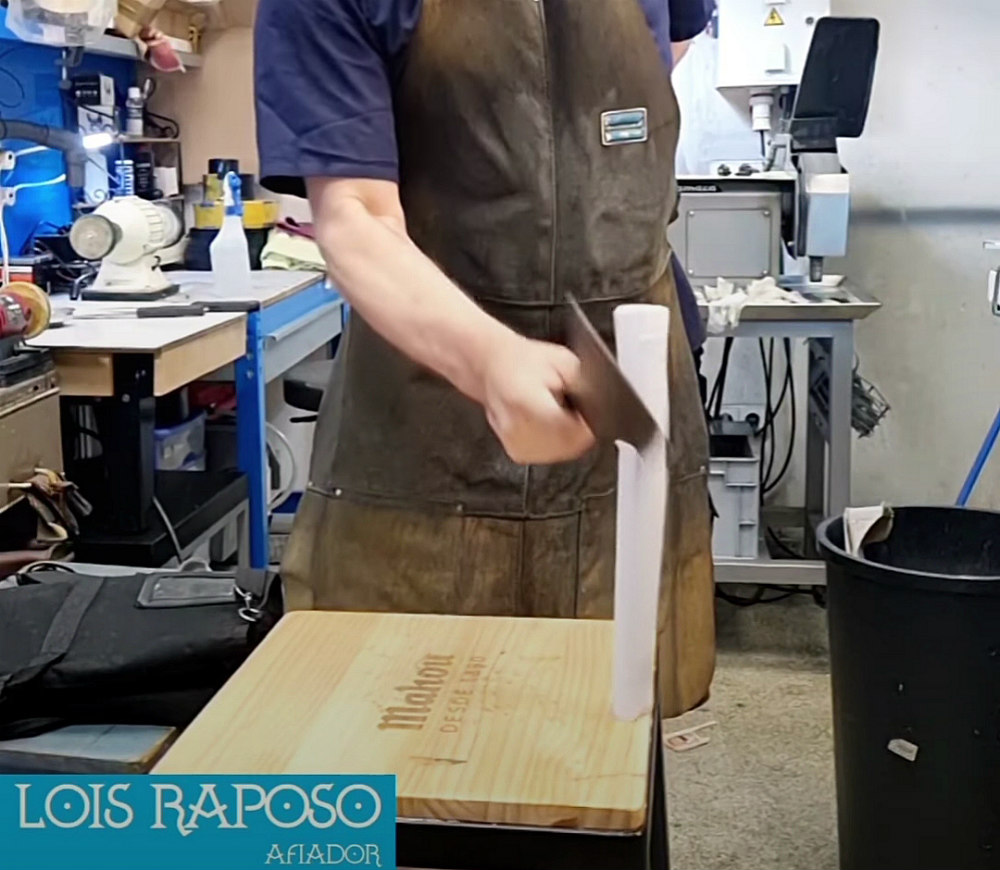
“In the US sharpeners believe that all knowledge is provisional and available to everyone, because something better eventually will come out and supersede it. Knowledge is in constant evolution.” But in Spain, unlike France where there is a school for itinerant knife grinders, this profession is neither recognized nor protected and it is rather seen as something marginal. This is the most paradoxical thing: what modern knife grinders find most transformative about their professions sharing knowledge counts for their detractors as the principal reason to dismiss them. This situation encourages forgery, explains Lois Raposo, “and opportunists who claim to be knife grinders and drive with vans through neighbourhoods in Madrid and either do not offer a good service or just cheat.”
I believe that if you have little resources, you may consider buying a good tool and making it last. It will be cheaper in the long run.
Moreover, Lois Raposo laments the loss of tradesmen like shoemakers, tailors, goldsmiths and their physical workshops from the public space in city centres which are replaced by retailers of industrial wares that do not need the services of knife grinders. He continues explaining that “markets in cities are disappearing and with it the traditional knife grinder. At market halls knife grinders used to offer their sharpening services to neighbours, in addition to repairing umbrellas and other small repairs to household tools at a time when nothing was thrown away and everything was recycled,” says Lois Raposo.
Increasingly, the economic arguments for the disappearance of craftsmanship in cities are supplemented by arguments about the environment and resilience. The global economy of producing in one place and selling in other has gone mad, while the local economy is struggling in some cities. But the values of craftsmanship are replete with calls for living with more solidarity and less consumerism. In a speech by sociologist Richard Sennet at the Centre de Cultura Contemporánia de Barcelona (CCCB) about his book The Craftsman and the City he stated that “the figure of the craftsman is a kind of cultural measure for looking at what capitalism does to the value of the things we do to survive every day.”
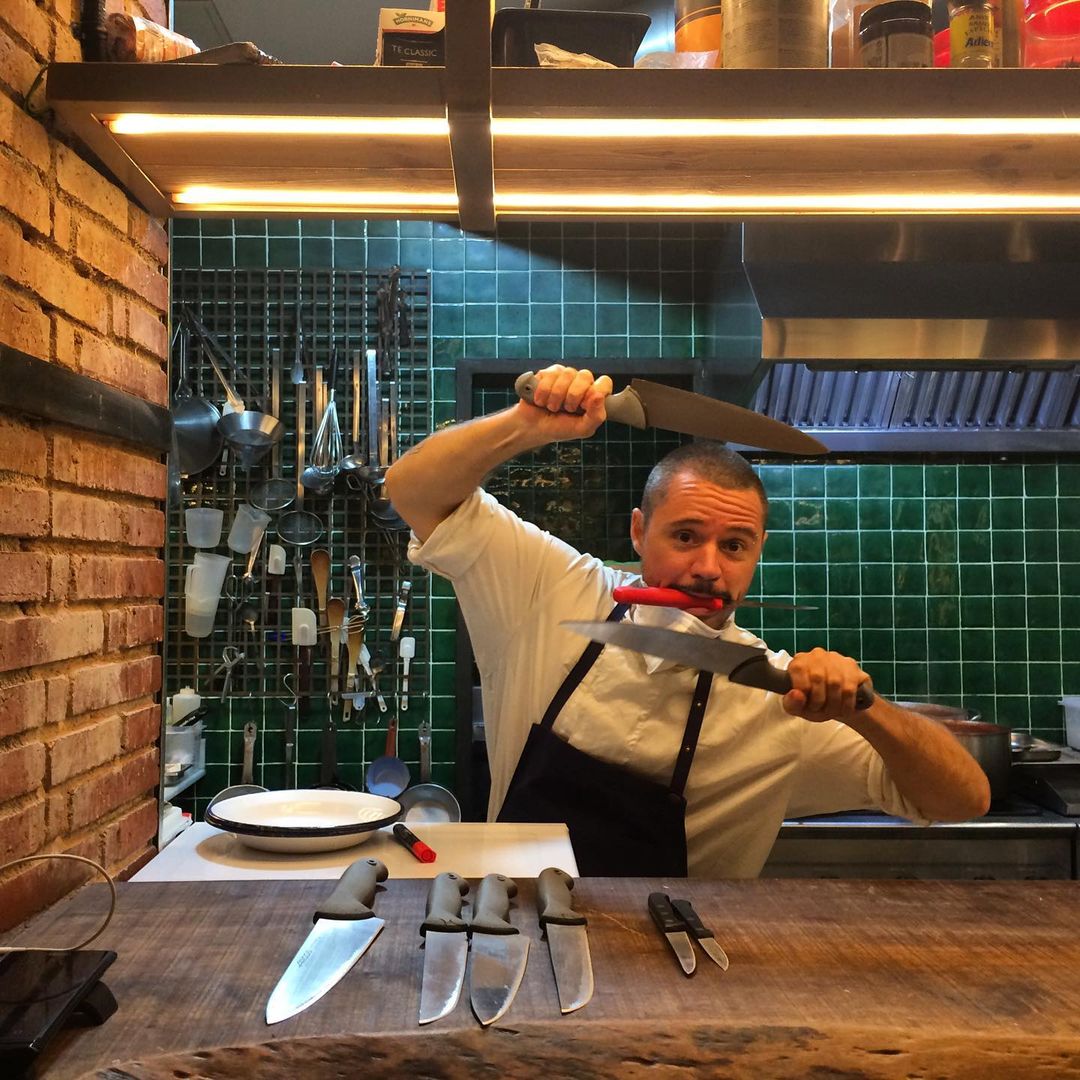
La Afiladora agrees with Lois Raposo that we live in a throwaway culture. “People do not care about what they have and care even less about doing a well-maintenance of their knives at home. But if you think about it, a good knife will outlive their owners because they have a much longer life than us. I have sharpened really expensive scissors that have survived their original owners and passed to the next generation. This is why I believe that if you have little resources, you may consider buying a good tool and making it last. It will be cheaper in the long run.”
I rush to add that this consumption pattern would also be good for the planet but Lois Raposo reminds me of a baffling reality. Unfortunately the environmental argument is not enough to make people buy less and repair and maintain things. “The argument should be really about the benefits for the buyers, that they will save money.”
During my conversation with Lois Raposo some hope shows for the revival of craftsmanship in cities because “craftsmen have not entirely disappeared, they are just elsewhere. They are taking refuge in what can be considered a ‘luxury market’ for people who appreciate it and therefore are willing to pay high prices.” Lois Raposo sees the urge to recover the figure of the apprentice, “but labour regulation in Spain needs to change to give opportunities to youngsters to enter these professions and develop them.”
The next industrial revolution will care about sustainability and maybe workshops could create a model of the new urban factory. Knife grinders resisting in Barcelona and Madrid offer a glimpse of craftsmanship that could be mutating in cities. In an urban world where it is more and more difficult to find somebody who will fix your shoes or sew a zipper onto your jacket, or sharpen a knife, urban dwellers may soon discover that globalisation is not the only answer – and other alternatives should be back on our streets if we really care about the planet.
